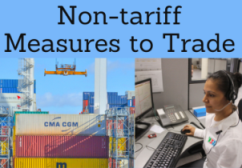Trade Preferences among Developing Countries

Global System of Trade Preferences among Developing Countries (GSTP)
- Introduction to the Global System of Trade Preferences among Developing Countries (GSTP)
- Preferential tariffs under the GSTP
- São Paulo Round Protocol (SRP) - not in force

The Subject “Global System of Trade Preferences among Developing Countries (GSTP)” belongs to the following Online Programs taught by EENI Global Business School:
Courses: Foreign Trade Management, Export Assistant.


Masters: International Business, Foreign Trade.
Languages 
 Sistema Global de Preferencias Comerciales entre Países en Desarrollo (SGPC)
Sistema Global de Preferencias Comerciales entre Países en Desarrollo (SGPC)
 Système global de préférences commerciales entre pays en développement (SGPC)
Système global de préférences commerciales entre pays en développement (SGPC)  Medidas sanitárias e fitossanitárias.
Medidas sanitárias e fitossanitárias.

Global System of Trade Preferences among Developing Countries (GSTP).
The objective of the Global System of Trade Preferences among
Developing Countries (GSTP) is to
promote foreign trade and economic growth among 42 developing countries,
including 7 Least Developed Countries (LDCs). Currently the GSTP only covers
preferential tariffs. In practice, few concessions have been implemented under the GSTP. South-South exports grew 12% annually between 1995 and 2017.
The Global System of Trade Preferences among Developing Countries (GSTP) was
created in 1989 by the G-77 as a platform for South-South collaboration. The
GSTP is administered by the Conference on Trade and Development (UNCTAD).
The member countries of the Global System of Trade Preferences among
Developing Countries (GSTP) are:
Algeria, Argentina, Bangladesh, Benin, Bolivia, Brazil, Cameroon, Chile, Cuba, Ecuador, Egypt,
Ghana, Guinea, Guyana, India, Indonesia, Iran, Iraq, Libya, Malaysia, Mexico, Morocco, Mozambique, Myanmar, Nicaragua,
Nigeria, North Korea, Pakistan, Peru, Philippines, Singapore, Sri Lanka, South Korea, Sudan, Thailand, Trinidad and Tobago, Tunisia, Tanzania, Venezuela, Vietnam, Zimbabwe and the MERCOSUR.
Burkina Faso, Burundi, Haiti, Madagascar, Mauritania, Rwanda, Suriname, Uganda and Uruguay have requested access to the Global System of Trade Preferences among Developing Countries (GSTP).
The Global System of Trade Preferences among Developing Countries (GSTP) covers:
- Preferential measures, rules of origin and tariff reductions in favor of the Least Developed Countries (LDCs) of the GSTP: Bangladesh, Benin, Guinea, Mozambique, Myanmar, Sudan and Tanzania
- Preferential tariffs
- Non-tariff Measures
- Direct trade measures
- In the GSTP there is no obligation to grant reciprocal concessions

In December 2010, the Third Round of Trade Negotiations of the GSTP (Sao Paulo Round) was held, as of today it has not entered into force with the aim of expanding and deepening tariff concessions. The São Paulo Round Protocol (SRP) was adopted and signed by Argentina, Brazil, Paraguay and Uruguay (MERCOSUR), Republic of Korea, India, Indonesia, Malaysia, Egypt, Morocco and Cuba.
(c) EENI Global Business School (1995-2024)
We do not use cookies
Top of this page



